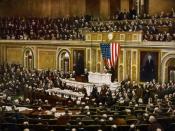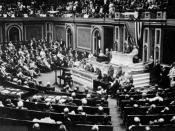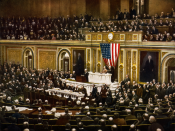Relatively Speaking... The Causes of America's Declaration of War on Germany
From as early as the late nineteenth century, the seeds for European conflict had already been sown. While a system of alliances existed which maintained a balance of power, a nationalistic fervor was running high in Austria-Hungary, which was a multi-ethnic empire. These two factors led to what the world would call "The World War" and what President Woodrow Wilson would call "The War to End All Wars". Although this conflict began and was fought in Europe, Americans soon became entangled in this conflict also for many different reasons and were eventually pulled into war. Primary reasons for America's entrance into this war were the German's naval policy, American economic interests, and President Wilson's idealism. However, these reasons are not equally important. Wilson's idealism about international relations and neutrality was less of a contributing factor than America's economic interests and Germany's naval policy into the conflict.
Germany's unrestrained submarine warfare violated standard international law and constituted an affront to America, which was a neutral nation. This violation was first demonstrated in the sinking of the British passenger ship, the Lusitania, in May, 1915, which carried 128 Americans onboard. Although after the incident, it was discovered by the Americans that the Lusitania carried concealed munitions onboard, this was not known to the general American public at the time. Consequently, the American public was enraged by this naval violation on a civilian passenger liner. Later that same year, another British passenger ship, the Arabic, was sunk by the Germans, killing two Americans. Although both of these ships were not American, the American public was deeply aroused by the bloodshed and the loss of American civilians'' lives. In response to the Lusitania affair, President Wilson sent notes through diplomatic channels...


